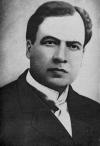Biography
Félix Rubén García Sarmiento, known as Rubén Darío, was a Nicaraguan poet who initiated Spanish-American literary movement known as modernismo (modernism) that flourished at the end of the nineteenth century. Darío has had a great and lasting influence on twentieth-century Spanish literature and journalism. He has been praised as the "Prince of Castilian Letters" and undisputed father of the modernismo literary movement. Darío is revered as Nicaragua's greatest diplomat and a leading voice of Central and South America.
French poetry was a determinant influence in Dario's formation as a poet. In the first place, the romantics, particularly Victor Hugo. Later on, and in a decisive fashion, Dario was influenced by the parnassians: Théophile Gautier, Catulle Mendès, and José María de Heredia. The final defining element of Darianian esthetic is his admiration towards the symbolists, most importantly, Paul Verlaine. Recapitulating his own poetic trajectory in the initial poem of Cantos de vida y esperanza (1905) Dario himself synthesized his main influences when he affirms that he was "strong with Hugo and ambiguous with Verlaine" ("con Hugo fuerte y con Verlaine ambiguo".)
In the section "Palabras Liminares" of Prosas Profanas (1896) Dario had already written a paragraph that reveals the importance of French culture in the development of his literary work:
The old Spaniard with a white beard points towards a series of illustrious portraits: "This one -he says- is the great Miguel de Cervantes Saavedra, one-handed genius; this one is Lope de Vega, this one is Garcilaso, this one Quintana." I ask him for the noble man Gracián, for Teresa of Ávila, for the brave Góngora and the strongest of all, Francisco de Quevedo y Villegas. Then I say: "Shakespeare! Dante! Hugo...! (and in my head: Verlaine...!)"
Then, when saying goodbye: "-Old man, it is important to say: my wife is from my land; my mistress is from Paris."
Los raros is an illustrative volume regarding Dario's literary tastes, which he published on the same year as Prosas profanas, and dedicated to briefly glossing some of the writers and intellectuals towards whom he felt profound admiration. Amongst those in the book we find Edgar Allan Poe, Villiers de l'Isle Adam, Léon Bloy, Paul Verlaine, Lautréamont, Eugenio de Castro and José Martí (the latter being the only one mentioned who wrote their literary work in Spanish.) The predominance of French culture is more than evident. Dario wrote: Modernism is nothing more than Spanish verse and prose passed through the fine sieve of the good French verse and the good French prose."
This is not to imply, however, that Spanish literature was of no importance to his work. Setting aside his initial stage, before Azul..., in which his poetry owes a great deal to the great names of XIX century Spanish poetry, such as Núñez de Arce and Campoamor, Dario was a great admirer of Bécquer. Spanish themes are well represented in his work, already in Prosas profanas and, specially, after his second trip to Spain, in 1899. Conscious of contemporaneous Spanish decadence in politics and the arts (a preoccupation he shared with the so called Generation of '98), he frequently was inspired by characters and elements of the past. This is what happens, for example, in his "Letanía de nuestro señor Don Quijote", a poem included in Cantos de vida y esperanza (1905), in which he exalts Don Quijote's idealism.
Regarding authors in other languages, it is worth mentioning that he felt a profound admiration towards three writers from the United States: Ralph Waldo Emerson, Edgar Allan Poe and Walt Whitman ..






